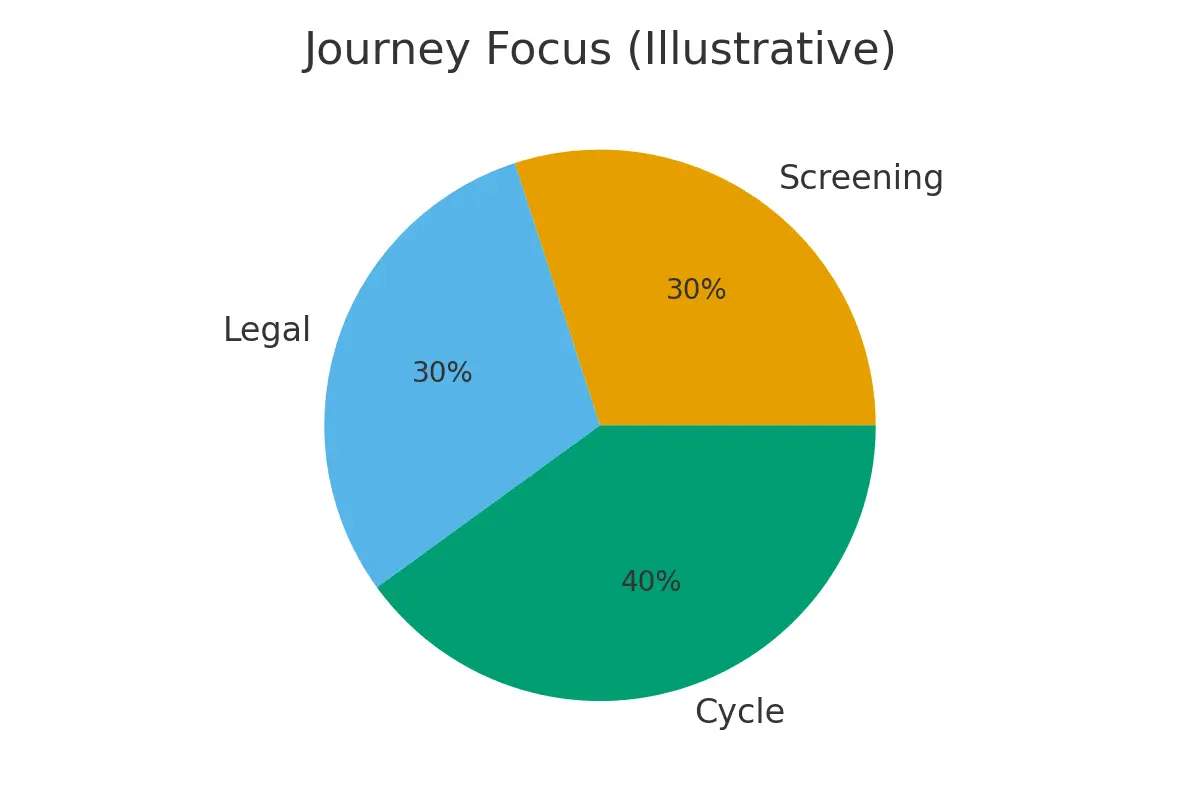
This article explains embryo donation — matching, legal, and expectations within the Donor Options (Eggs vs Embryos vs Sperm) pathway. We focus on practical choices that change outcomes, budgets, and timelines—so you can move forward with confidence.
What It Is
Embryo Donation — Matching, Legal, and Expectations in plain English: a pathway where individuals or couples receive embryos created by another family. It outlines how matching works, what legal protections are required, and what expectations help create smoother emotional and logistical experiences. It also highlights how early decisions affect downstream steps like transfer timing, storage planning, and future family-building.
Who It Helps
Embryo donation is often a strong fit for:
- People who want the highest chance of pregnancy per transfer at the most predictable cost
- Patients who cannot use their own eggs or sperm
- Those who prefer a simpler, shorter path than coordinating an egg donor cycle
- Individuals or couples open to non-genetic parenthood
Signals that suggest when to consider another path include very specific genetic matching needs, desire for multiple genetically related siblings, or medical criteria requiring fresh gametes.
Step-by-Step
A simple, sane sequence with timing checkpoints to protect embryo quality and reduce stress:
- Medical review & eligibility confirmation
- Profile creation and matching (clinic, agency, or embryo bank)
- Legal contracts and counseling (required for both parties)
- Embryo release, transport (if needed), and lab verification
- Uterine preparation and transfer planning
- Embryo transfer day
- Post-transfer follow-up and next-step planning
This structure keeps the process predictable, even when donor timelines vary.
Pros & Cons
Pros
- High predictability in cost and timeline
- No stimulation, retrieval, or donor synchronization
- Lower emotional and logistical load
- Often high embryo quality due to being created by families who previously conceived successfully
Cons
- No genetic link to either parent
- Limited control over number of embryos available
- Donor family’s medical history may be incomplete
- Fewer options for future genetically related siblings
Balanced expectations help patients decide whether simplicity or genetic connection matters most.
Costs & Logistics
A clear breakdown of:
- Matching or program fees (clinic, agency, or embryo bank)
- Legal contract costs
- FDA/clinic compliance and record transfer fees
- Storage, shipping (if required), and lab verification
- Uterine preparation, medications, and transfer fees
We outline how to anticipate prior authorizations, manage cash-flow, and prevent surprise bills through structured tracking.
What Improves Outcomes
Actions with proven impact:
- Selecting programs with strong medical screening and transparent embryo creation history
- Ensuring updated infectious-disease screening from both donors and recipients
- Verifying embryo grading and vitrification method
- Optimizing uterine lining before transfer
Actions that rarely change outcomes: over-customizing match preferences, unnecessary additional testing, or assuming more embryos always equal higher success.
Case Study
A patient with multiple failed IVF cycles is unsure whether to pursue donor eggs or embryo donation. Through structured discussions, medical review, and cost/timeline modeling, they realize embryo donation offers a faster, lower-stress path with clear expectations. Defined thresholds (embryo quality, legal clarity, and counseling completion) help them move from uncertainty to a confident, realistic plan.
Mistakes to Avoid
Common traps and how to prevent them:
- Starting without legal contracts that clearly define parental rights
- Assuming all embryo banks provide full genetic history
- Overlooking the number of embryos available for future siblings
- Failing to confirm clinic compatibility with external embryo banks
- Delaying uterine preparation until the last minute
Checklists and early verification help keep the process smooth and predictable.
FAQs
Q. How does embryo donation differ from using an egg donor?
Ans. Embryo donation provides already-created embryos, while egg donation requires fertilizing eggs with sperm first. Embryo donation is usually faster and less expensive.
Q. Can I get multiple embryos for future siblings?
Ans. Sometimes, but not always. Availability depends on the donating family’s remaining embryos.
Q. Do I still need legal contracts?
Ans. Yes. Contracts protect parental rights, outline donor/recipient expectations, and prevent future disputes.
Q. What medical screening comes with donated embryos?
Ans. Typically: medical history, infectious-disease screening, embryo quality information, and lab records from the original IVF cycle.
Q. Are success rates high with donated embryos?
Ans. Success rates are generally strong because many donated embryos come from couples who successfully conceived with IVF.
Next Steps
- Free 15-min nurse consult
- Upload your labs
- Get a personalized cost breakdown for your case
Related Links

Dr. Kulsoom Baloch
Dr. Kulsoom Baloch is a dedicated donor coordinator at Egg Donors, leveraging her extensive background in medicine and public health. She holds an MBBS from Ziauddin University, Pakistan, and an MPH from Hofstra University, New York. With three years of clinical experience at prominent hospitals in Karachi, Pakistan, Dr. Baloch has honed her skills in patient care and medical research.





